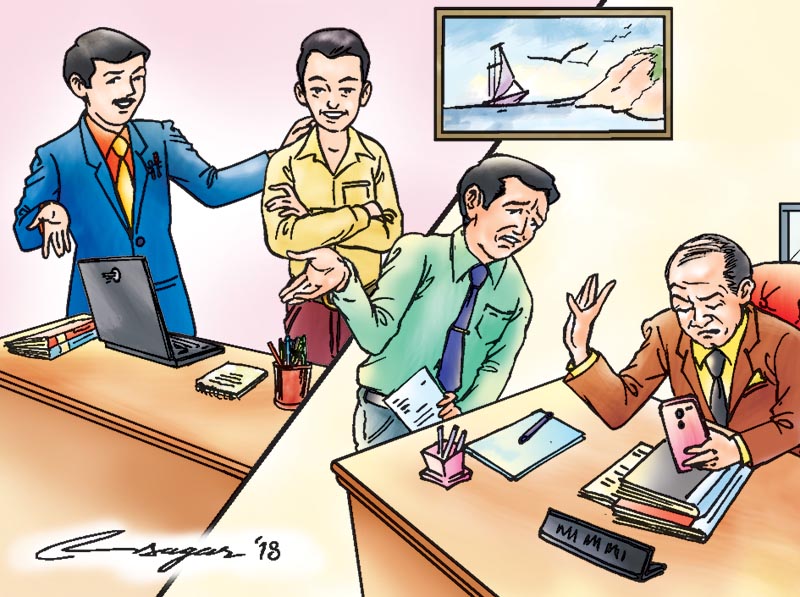Profession vs position: Understand the goal
Hierarchy and positions in any office setup are created to ease the operation – not to ensure that a handful of people keep dictating others. Unless there is respect for each other and understanding of the collective goal, positions don’t matter
In any professions, there is a position one holds. This is how it works. Do you think you love your profession when you serve the people? To what extent do you love your position?
Basically, most of the people give more importance to their position than their profession. There are multiple factors associated to value the position highly than the profession itself such as personal interest, economic interest, egoism, attitude, low level of credibility, and lack of respect for others among others.
In Nepal’s context, there are different types of professions ranging from technical to non-technical, higher to lower, professional to non-professional and profit to non-profits. Some tangible professions in Nepal are medicine, health promotion, training, public health, occupation health, nurse, engineer, agriculture, forest, social work, advocate, teachers and research among others.
Within these professions, there might be different levels of positions ranging from support staff to secretary (first class officer). There are many other levels within these professions.
In fact, a profession is one of the most important aspects of everyday life. But most people attach more importance to their position than the profession, which can have an adverse effect on organisational as well as personal development. Such type of practice indicates a low level of understanding about development and people’s benefits.
There are mainly two categories of nations in the world: developed and developing.
People with the professional background who are affiliated to any organisation from developed countries show different tendencies when it comes to giving respect to everyone and dedicating their entire services, which help their clients. They work for clients’ satisfaction by respecting everyone irrespective of the position they hold. They work in the organisation with a fantastic and joyful environment. Hardly is there any tension among employees in the office because of their personal interest.
During my stay in Denmark between 2008 and 2010, I found Danish professionals very appreciative, honest, helpful and cooperative, who would strive for result-oriented work. They show huge loyalty to the general public. I am observing a similar practice in Australia where I am doing my PhD in Health Promotion. My international friends from Canada, Europe, Japan and many other developed countries of the world also have the similar mindset and attitude.
Supportive and democratic teachers are always impressive. They devote themselves to their job and work with the utmost respect for each other. They have minimum concern for other people’s personal matters.
But my experience has been different in developing countries, say in Nepal.
People who hold senior positions like secretary, director, manager, principal, or chief of the office never fail to show their dominating attitude towards their subordinates. This practice is traditional and non-scientific, which affects overall performance.
Such type of attitude is one of the reasons our country is lagging behind.
In Nepal, those professionals who hold “higher positions”, or are bosses, tend not to show a cooperative attitude, as a result, the overall functioning gets affected. And there is also a tendency among people who indulge in blame game whenever there is something wrong.
To overcome such practices a few basic standards and norms can be applied. Firstly, professionals must focus on client-oriented services. All the professionals must have a positive attitude and there should be a sense of service delivery. They need to understand why they are there – and what the optimum goal is – and how that can be achieved.
Unless there is respect for each other in an organisation, nothing works.
All the professionals should have a clear understanding of their collective goal and individual’s work profile. They must understand that they are in the system for the ultimate benefit of the clients and not to fulfil their personal interests.
All the staff in any organisation must avoid their personal interests and should work in collaboration in the larger interest of the company and the people it serves.
In Nepal, we usually see officials procrastinating. They tend to keep aside the work for the next day even if it can be done then and there. Sometimes, those holding top positions do so only to “prove” that they are on top and that they are the bosses, which is very frustrating for the service seekers.
Irrespective of the positions the staff hold in an organisation, they should work towards creating a win-win situation.
To ensure all these, we should adopt the best practices. High-level officials from the government keep visiting different countries for seminars and conferences. They do see and learn how things work in other countries but they do not tend to apply what they see and learn. Such seminars, conferences and visits provide them with good opportunities to bring the best practices home and apply them in their workplace.
Hierarchy and positions are created to ease the operation – not to ensure that a handful of people keep dictating others all the time.
Dhital, a health officer at National Health Education, Information and Communication Centre, is doing his PhD in Health Promotion from Australia






